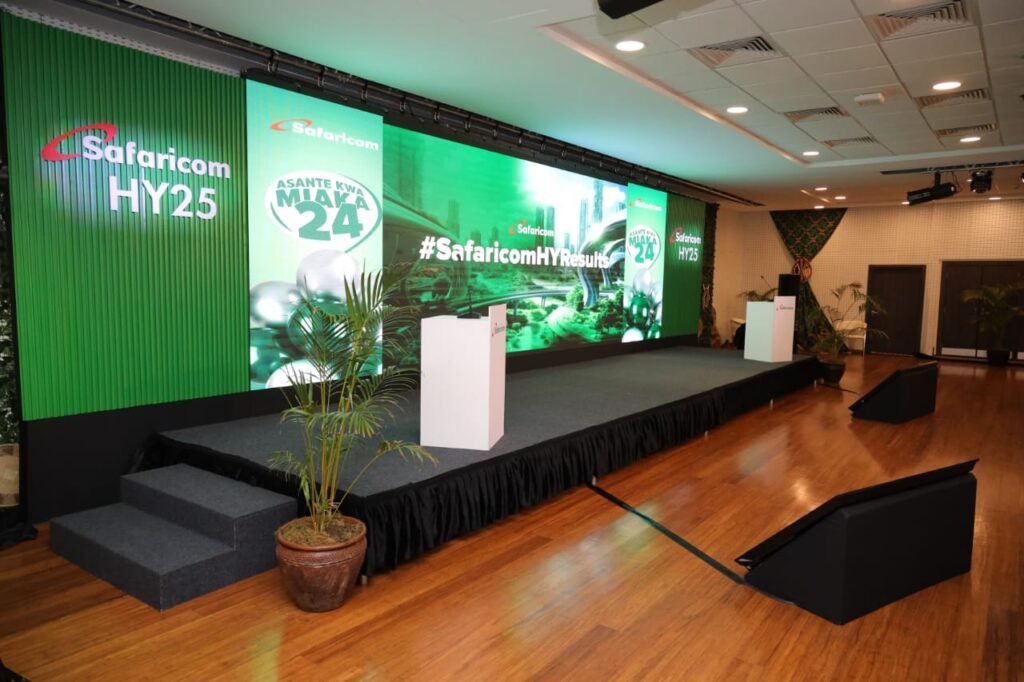Safaricom group has announced a decrease in its profit after tax despite increasing its total revenue in the six-month period ending 30th September 2024.
The group recorded a fall in its profit after tax which stood at Sh10.01 billion as compared to Sh27.19 billion in the same period last year. This decline is largely attributed to the depreciation of the Ethiopian currency, the Birr.
According to Dilip Pal, Safaricom PLC CFO, as of 30 September 2024, the Birr’s value against the US Dollar was 118.99, a depreciation of 106% from the 57.69 value in June 2024. This was due to the implementation of a floating exchange rate regime by the Ethiopian Central Bank.
However, despite the drop in revenue, overall total revenue (group service revenue in addition to handset revenue and other revenue) witnessed an 15.1% increase to Sh189.42 billion from the Sh164.62 billion recorded in the six months ending 30th September 2023.
The overall group service revenue marked the highest growth increasing by 13.1% to stand at Sh179.92 billion. This growth is attributed to the continued strong performance of Safaricom’s various business segments, particularly the M-PESA mobile money service, mobile data and fixed data.
In the Kenyan market, mobile data revenue recorded the most growth increasing by 20.2% to stand at Sh35.55 billion. This was mainly as a result of an 18.6% increase in the number of data customers using over 1GB of data per month.
M-PESA revenue recorded growth in the half year to stand at Sh77.22 billion, mainly driven by a 13.1% increase in the average revenue per user which grew from Sh344.05 to Sh389.27 monthly. Also, fixed service and wholesale transit revenue increased by 14.7% to Sh8.45 billion supported by increased connections and initiatives.
As a result, the company saw its earnings before interest tax, depreciation and amortisation (EBITDA) increased and earnings before interest and tax (EBIT) both grow by 13.7% to Sh102.92 billion and 18.0% to Sh79.19 billion in the period respectively.
Despite recording a rise in M-PESA revenue and registered customers in the Ethiopian market, Safaricom recorded a loss of Sh37.53 billion in the period as result of the depreciation. Its M-PESA revenue closed the half year at Sh24.4 million while registered customers increased greatly from 1.16 million to 8.31 million.
Safaricom’s overall customer base grew by 7.8% year-on-year to reach 52.01 million, while its one-month active customer base increased by 10.8% to 39.75 million.
According to Peter Ndegwa, Safaricom’s Chief Executive Officer, the company remains focused on delivering a strong performance and continuing to invest in its network and innovative service offerings to its growing customer base.
“We will continue simplifying our customer journeys and will intensify our focus on new growth areas to continue our momentum in the second half of the year,” he added.
With a mission to be known as the tech and financial services partner of choice for enterprises and the public sector by 2030, Safaricom will need to continue exploring ways to optimize its operations, manage costs effectively, and find new revenue streams to offset the impact of the currency fluctuations.
How the company handles the second half of the year, especially with currency fluctuations, will be closely monitored by shareholders and investors.


